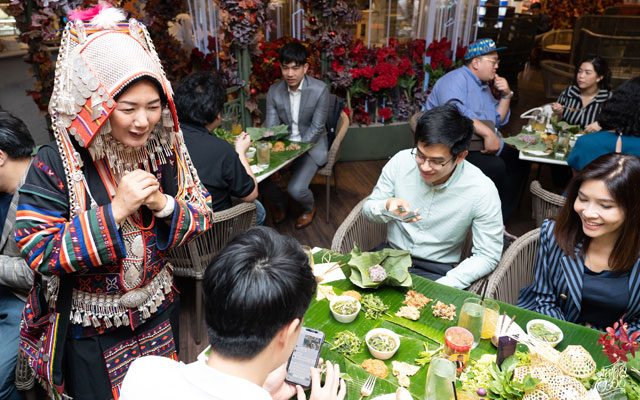Thailand is diversifying its support for business events, while operators take groups ever deeper into the heart of local communities

As a well-known destination with a mature travel industry and a geographical advantage, Thailand has consistently worked towards improving itself when it comes to business events.
Take for example the country’s involvement in developing both the ASEAN MICE Venue Standard and Thailand Mice Venue Standard – the latter certifying 453 of its own venues – as a benchmark for the industry.

Before Covid-19 happened, TCEB was targeting 4Ms, or four meetings categories for 2020: groups travelling to potential cities (Meet Now); large-sized groups (Meet Mega); groups that conform to Thailand’s 4.0 policy (Meet Smart); and groups with sustainable activities (Meet Sustainable 2020) in 12 key industries ranging from Medical & Wellness Tourism to Smart Electronics.
The country is ready to hand out special perks and privileges, such as a dedicated MICE Lane at the airport, cultural performances, souvenirs and a conditional supporting budget of up to one million baht (US$30,497).
For the incentives market, Thailand released the APAC MaxiMICE in partnership with THAI Air and THAI Smile at the end of 2019.
Exhibitions are not forgotten, as Thailand has also trained its eye on the sector through its Exhibition Redefined; 360 Exhibition Success programme, with TCEB bidding for 18 conventions by 2026.
Despite events getting the boot due to the coronavirus outbreak, Thai CVBs and DMCs are optimistic their sector will be one of the first in the travel industry to bounce back, and that Thailand will continue on its previously buoyant trajectory once the situation is back to normal.
“Before Covid-19, we had a fantastic pick up on Thailand’s inbound business events performance throughout 2019. We were actually expecting 2020 to exceed what we had achieved for 2019 as we had already secured a few events in 2020. We were also receiving enquiries on 2020 events even before 2019 had ended,” shared Max Boontawee Jantasuwan, founding CEO of Events Travel Asia Group and president, SITE Thailand Chapter.
Anthony Lark, president of Phuket Hotels Association also described Phuket’s inbound business events as growing well, particularly for the Indian market due to an increase of direct flights. There is also strong demand from major markets like China and Australia.
“We expect this to continue after travel restrictions are lifted,” he noted, adding that Phuket hotels have been increasing the capacity of their event venues to cope with the influx.
Nooch Homrossukhon, director, meetings and incentives, TCEB, shared that TCEB – in conjunction with SITE and other local organisations such as PHA – is working on new marketing messages to help the market recover faster post-crisis, buoyed by the Thai government’s 200 million baht (US$6.1 million) relief funding for the business events sector.
The main target will remain Thailand’s primary markets – corporate travellers from ASEAN+6 group (China, India, Japan, South Korea, Australia and New Zealand) and the US, with Europe remaining as a secondary market.
Nooch also shared that a reduction of Thailand’s reliance on China’s meetings and incentives market has led the bureau to invest more in India, and diversify to roadshows in tier-two and tier-three Indian cities such as Hyderabad and Jayapura.
An expanding Thai MICE Cities network
Previously, Thailand was heavily promoting the former secondary MICE Cities of Chiang Mai, Pattaya, Khon Kaen and Phuket alongside Bangkok. In total, these cities welcomed around 34.7 million domestic and international MICE travellers in 2018.
During the Thai MICE Forum in August 2019, TCEB president Chiruit Isarangkun Na Ayuthaya shared new second-tier MICE destinations will include Chiang Rai, Phitsanulok, Udon Thani, Hua Hin, Cha-am, Rayong, Songkhla, Nakhon Ratchasima and Surat Thani.
Max sees this as a positive development for the industry, stating: “This is one of the developments we are most excited about. An incentive is about experiences, so more development and promotion of (new) cities will (lead to us being able to offer) more products and destinations (to groups).”
Sustainable horizons
In early 2019, TCEB introduced 25 new routes for delegates visiting the country’s top five destinations, Bangkok, Pattaya, Phuket, Chiang Mai and Khon Kaen.
Working closely with the public and private sectors, as well as educational institutions, the new routes enhance travel experiences through the bureau’s Thailand 7 MICE Magnificent Themes. TCEB has also joined with entrepreneurs in the above-mentioned five cities to campaign for zero plastic events, aiming to turn them into environmentally sustainable cities by cutting waste volume by 50 per cent.
Grassroots connections
In recent years, local operators and hotels have committed to injecting local flavour into business event experiences.
One innovative example is Local Aroi in Bangkok, which hosts eight-course fine-dining events with menus featuring local cuisine and served by local communities of different regions of Thailand, including hilltribes.
There is also a cooking, garland-making and market hunt for up to 150 people. Hosted by Market Experience, participants can learn to cook authentic Thai dishes overlooking the Pak Khlong Talad Flower Market, and enjoy their own culinary creations by the riverside at the nearby Mango Tree.
In the north, HiveSters showcases disappearing culture at Huen Chom Chan, a cultural space and school for art and folk music, by enlisting local masters to teach guests how to write the Lanna alphabet. Guests may also learn about soap nut tree carvings, try their hand at cooking local dishes, and visit the Tham Luang–Khun Nam Nang Non Forest Park.
Several local operators also offer more customisable CSR projects. For instance, Trunk Travel enlists corporate volunteers to help build camps for rescued elephants to retire in. Volunteers also get to reside in a homestay and partake in cooking, and tribal arts and craft classes.




















